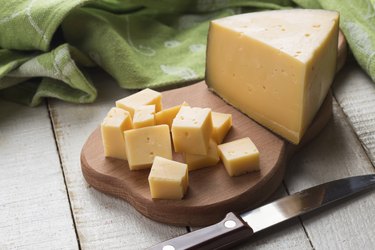
The dairy food group -- which includes milk, cheese and yogurt -- serves as an important source of calcium in your diet. Guidelines released by the U.S. Department of Agriculture recommend including the equivalent of 3 cups of dairy in your diet each day, and a 1.5-ounce serving of hard cheeses, such as Gouda, counts as one cup. Although it's high in fat and calories, Gouda's nutrient content makes it a worthwhile addition to your diet.
Nutrition Basics
Video of the Day
Each serving of Gouda -- 1.5 ounces -- contains 151 calories, or approximately 8 percent of the daily calorie intake in a standard 2,000-calorie diet. Its 11.7 grams of fat account for 70 percent of its calorie content, providing energy you need to get through the day. Gouda also contains a moderate amount of protein -- 10.6 grams, which is 23 percent of the daily protein needs for women and 19 percent for men. This protein is made up of amino acids, which your body can use to maintain strong tissue. Each serving of Gouda also offers 0.9 gram of carbohydrates, a source of energy.
Video of the Day
Mineral Content
Gouda offers nutritional value thanks to its mineral content. Each serving of Gouda contains 298 milligrams of calcium, which is 30 percent of the calcium you need daily. Your body uses small amounts of calcium to support cellular communication and nerve transmission, and it also relies on calcium to maintain healthy bone tissue. Gouda also offers a significant amount of zinc, a mineral your body needs to regulate enzyme activity and support immune function. A serving of Gouda offers 1.7 milligrams of zinc -- 21 and 15 percent of the daily zinc intakes recommended for women and men, respectively.
Vitamin Content
Gouda offers a significant amount of vitamin B-12. Each serving provides 0.65 microgram, which contributes 27 percent toward your daily vitamin B-12 intake requirements. Vitamin B-12 allows for gene methylation, a process required to control gene activity, which is important for cancer prevention. It also plays a role in the growth of new red blood cells, and helps combat nerve damage. Gouda offers smaller amounts of other B-complex vitamins, including vitamins B-2, B-5 and B-6. Collectively, these vitamins support your metabolism and help you produce energy.
Considerations and Tips
Watch your portion size when consuming Gouda -- because even a small serving size contains a relatively large amount of calories, it's easy to accidentally consume more than one serving and significantly boost your calorie intake. Gouda also contains a significant amount of sodium -- 348 milligrams per serving, or 15 percent of your daily intake limit. Measure your portions using a food scale prior to serving, and pair Gouda with foods naturally low in sodium to limit your salt intake. Try adding cubes of Gouda to a spinach salad, or use Gouda to add flavor to a veggie-packed crustless quiche.
- USDA ChooseMyPlate: What Counts as a Cup in the Dairy Group?
- USDA National Nutrient Database: Cheese, Gouda
- U.S. Department of Agriculture: Part D. Section 2: Nutrient Adequacy
- Colorado State University Extension: Dietary Fat and Cholesterol
- Linus Pauling Institute: Calcium
- Linus Pauling Institute: Zinc
- Linus Pauling Institute: Vitamin B-12
- Colorado State University Extension: Water-Soluble Vitamins: B-Complex and Vitamin C
- USDA ChooseMyPlate: How Much Food from the Dairy Group Is Needed Daily?
- Linus Pauling Institute: Sodium (Chloride)